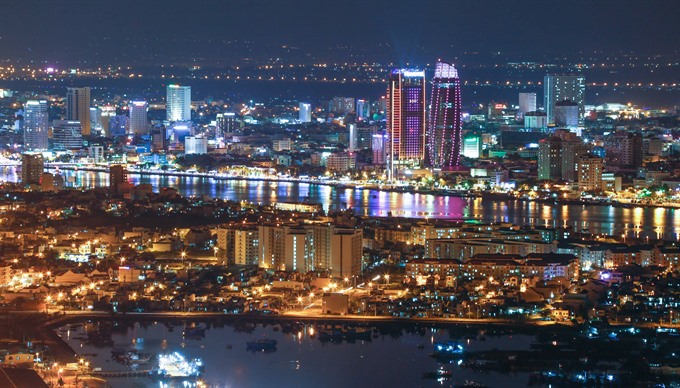City makes changes to long-term plans
The Da Nang People’s Committee has submitted amendments to its 2030 - 2050 socio-economic master plan for the Prime Minister’s approval.
 |
| A night view of Da Nang. VNS Photo Le Lam |
The municipal administration said that the adjustment proposal seeks to set new development targets that match updated base indices prepared by the Ministry of Planning and Investment.
It said that the previous socio-economic master plan until 2020, which was approved in 2010 based on 1994 statistics, has not kept pace with the rapid urban development experienced by the city over the last 5 years.
Da Nang has also proposed changes in technical infrastructure plan that will be compatible with it becoming a key tourism site in central region with ‘green’ growth, information technology (IT) applications for a smart city by 2030 (with vision until 2050), environmentally-friendly waste treatment and renewable energy.
In another proposal related to the city’s traffic flow, Da Nang has asked the national government for permission to build a 39km ring road connecting National Road No 14B and the Ho Chi Minh Trail. This project would be part of the city’s westward expansion during the 2017 - 2019 period.
The city said the project would use 1.5 trillion VND (US$66.4 million) raised from Government bonds and the city’s budget.
At a meeting of the city People’s Council last week, Da Nang also announced plans to develop the Tho Quang fishing wharf into a major fishing port and seafood logistics centre in the central region.
The wharf’s piers will be rebuilt to accommodate high-capacity fishing and fisheries logistics vessels. The project, covering 19.7ha, will also include an international fishing port and a seafood wholesale market.
The Tho Quang fishing wharf currently hosts 19,000 fishing boats, 23 seafood processing plants and 11 shipyard building centres.
The city also plans to build a wastewater treatment plant with a daily capacity of 300cu.m.
The city had submitted adjustments to its 2030 - 2050 master plan last year too, focusing on developing tourism as a core economic sector.
Da Nang has been expanding its airport to host the 2017 Asia-Pacific Economic Cooperation (APEC) Summit, and welcome 10 million tourists this year.
The national government had issued special decentralisation regulations last year, giving the city greater autonomy over attracting investment and managing its budget.
The city is a logistical hub for the central coastal region and the East-West Economic Corridor, which links Laos, Thailand, Myanmar and Viet Nam.
(Source: VNS/ DA NANG Today)